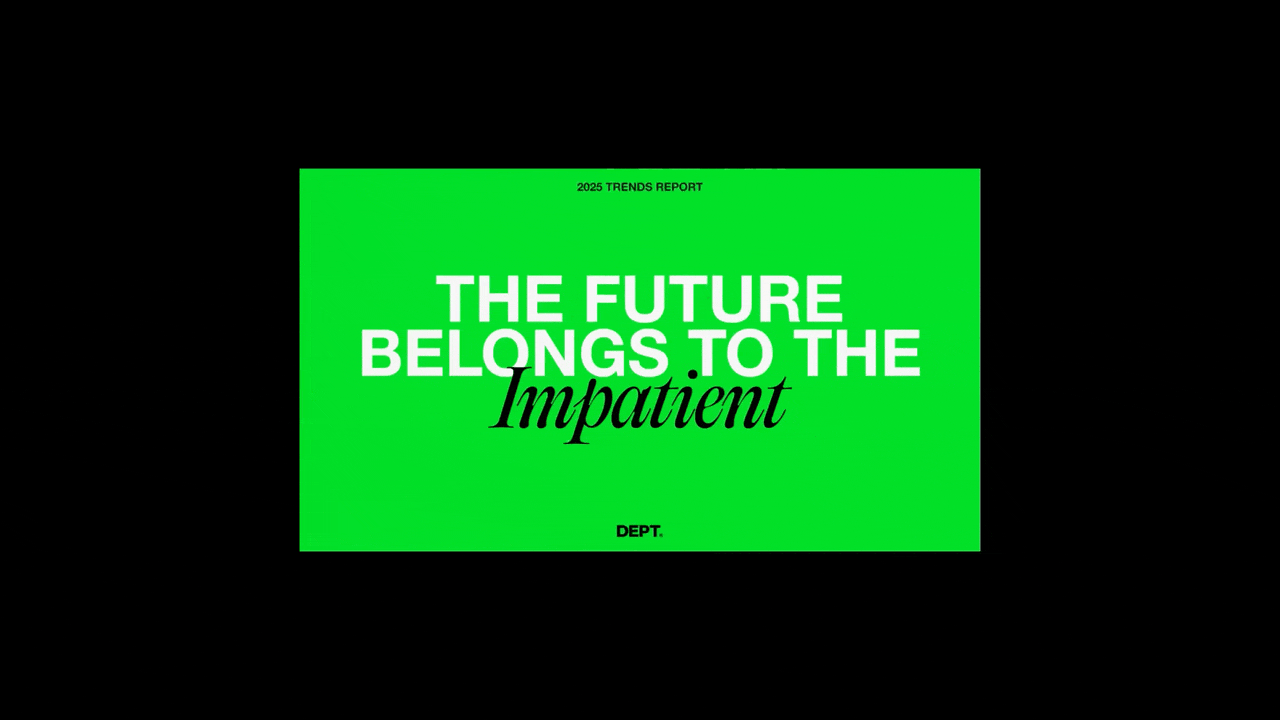5 AI predictions for 2025
AI is reshaping everything—from how brands market products to how organisations hire talent.
For executives, it’s tempting to see AI as a magic wand for quick wins or a surefire competitive edge.
But here’s the truth: successful AI initiatives aren’t built on hype. They depend on hard realities—like the strength of your data, the agility of your strategy, and how well you empower your people to work alongside it.
During the 2025 DEPT® Trends event, our team discussed how AI will transform businesses in the next year. But these transformations won’t just happen on their own. They begin by understanding how to make it work for your business in a meaningful, long-term way.
So, let’s cut through the noise with five AI predictions for 2025.
Data is the unsexy truth about AI
AI is only as good as the data it runs on, and—spoiler alert—that data is not always glamorous. Building a rock-solid data foundation is the unsexy but essential step for any AI initiative.
Thanks to generative AI, 75% of organisations have increased investments in data management. Yet only 41% feel ready to scale their efforts. Why the gap? Issues like data privacy, security, and compliance are holding them back.
Here’s the thing: Every successful AI project starts as a data project. It’s the sourdough starter of your AI strategy. Get this right, and you’ll move from AI proofs of concept to real, scalable results.
If you’re only making one big move this year, make it modernising your data infrastructure. Consolidate your data, ensure it’s clean and compliant, and get it AI-ready. If you do this, your brand will be able to differentiate itself—not just by using AI, but by using it in ways that have an impact.
Search will never be the same
The search landscape dramatically transformed in 2024. Zero-click AI summaries are more prevalent, challenging traditional SEO approaches.
Google’s Gemini highlights how search engines are evolving to integrate AI-driven insights. These developments require you to rethink your search strategies, focusing on optimising content for relevance and visibility in an AI-dominated environment.
Staying ahead means understanding how search engines prioritise content and anticipating future shifts. Proactive strategies that leverage AI to analyse trends and refine search tactics will be essential for maintaining digital prominence in this evolving landscape.
In 2025, efficiency is table stakes
For years, brands have treated new technology like a secret weapon. “This is it. This is what will make us untouchable.” But AI doesn’t play by those rules. In fact, it’s not a differentiator—it’s a democratiser.
As AI adoption accelerates, efficiency and insights are now table stakes. Increased accessibility to advanced tools means competitive advantages won’t come from the AI tools you’re using. The real differentiators will still be the basics: understanding your brand purpose, knowing your customers inside and out, and finding creative ways to stand out.
AI is also breaking down the walls we’ve built around competition. Consider Perplexity, a small player disrupting search with a differentiated product in a Google-dominated market. Their secret? Internal focus, great ideas, and a tight team.
For the C-suite, the takeaway is clear: don’t get lost in the AI arms race. Double down on what makes your brand unique. AI might level the playing field, but the game is still yours to win.
Personalisation at scale gets closer
Hyper-personalisation has long been heralded as the future of marketing, and recent advances in AI are finally making it achievable. The ability to deliver targeted, individualised content at scale is no longer theoretical—it’s within reach if you’re equipped with the right technology.
The challenge lies in infrastructure. Accelerated computing capabilities are essential for processing data quickly enough to generate real-time, hyper-personalised content. Additionally, your data must be clean, structured, and compliant to maximise AI’s potential.
Dynamic content optimisation and real-time targeting are poised to revolutionise marketing, minimising irrelevant messaging and improving customer experiences. Investment in GPU-accelerated platforms and data infrastructure is critical to unlocking these opportunities, ensuring your systems are ready for the next wave of AI-driven innovation.
AI as a collaborative work partner
Previous AI predictions were full of doom and gloom, but 1-1 replacement continues to be disproven. Instead, teams are finding new tools and methods to get work done. 75% of employees are using AI in their jobs, whether employers like it or not (and whether their employers know it or not). The problem with this is that it’s typically not deliberate or collaborative.
In 2025, you need teams to move from discrete use cases of AI to purposeful integration. Put an AI tool review process in place. Create official rules and conditions around employee use. Publish approved and prohibited AI tools in an easy-to-locate dashboard.
By embracing AI as a collaborative work partner and involving all teams, AI adoption will become faster and easier across your organisation.




